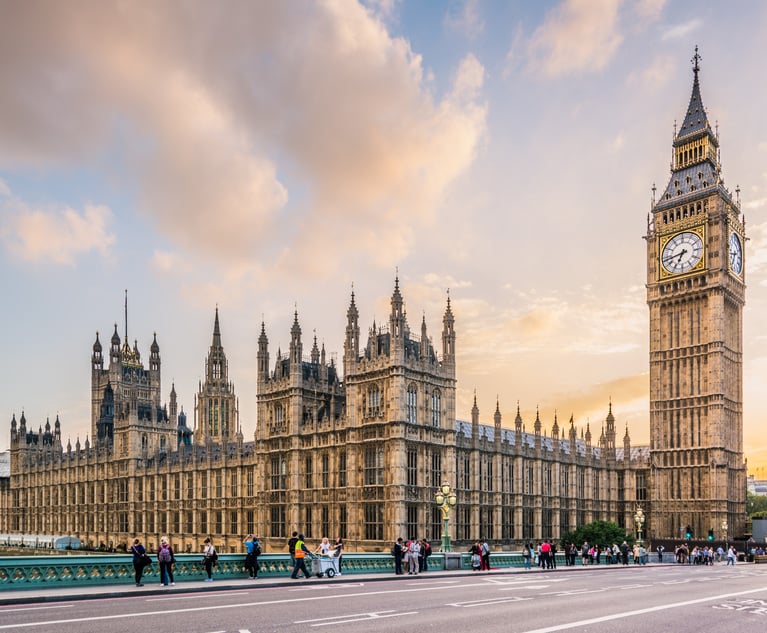Firms and chambers to be required to publish diversity data on websites
The Legal Services Board (LSB) has approved controversial plans to force law firms and barristers' chambers to publish internal diversity and social mobility statistics on their websites. Firms and chambers will now have to publish data on their lawyers' socio-economic background, age, race, and gender on their websites, as well as information about disabilities. However, the LSB has stepped back from earlier proposals that would have included a requirement to provide details about religion or sexuality.
July 26, 2011 at 08:12 AM
2 minute read
The Legal Services Board (LSB) has approved controversial plans to force law firms and barristers' chambers to publish internal diversity and social mobility statistics on their websites.
Firms and chambers will be required to publish data on their websites about the socio-economic background, age, race, and gender of their workforce, as well as information about disabilities.
However, the LSB has stepped back from earlier proposals that would have included a requirement to publish details about religion or sexuality.
The LSB, which approved the plans earlier this month (13 July), is hoping that making the information available to clients will put pressure on firms to further improve access to the profession.
The information will also be collated across the industry by approved regulators such as the Solicitors Regulation Authority (SRA), which will submit action plans on how to implement their proposals to the LSB in January 2012, with the first round of publication due to take place in December 2012.
The regulators will also collate sexuality and religious information, with the full picture to be used by the LSB in its efforts to boost social mobility and diversity in the profession.
LSB chief executive Chris Kenny (pictured) said: "Improving the diversity of the legal profession at access level continues to be a priority, but we also need to look at progression and retention across all levels of the workforce.
He added: "While there are some positive initiatives in place, greater transparency is needed to maintain momentum, measure progress and better inform consumers. This commitment to the publication of diversity surveys should help to ensure that the workforce better reflects communities from which it is drawn and will contribute to driving social mobility in England and Wales".
The proposals, initially reported in February after a consultation launched in December last year, were backed by charities including Mencap, Sense and Sutton Trust.
However they were criticised by charities such as Stonewall, which flagged the risk of inadvertently 'outing' gay, bisexual or transgender lawyers, with the LSB therefore removing the requirement to publish details of religion and sexuality.
This content has been archived. It is available through our partners, LexisNexis® and Bloomberg Law.
To view this content, please continue to their sites.
Not a Lexis Subscriber?
Subscribe Now
Not a Bloomberg Law Subscriber?
Subscribe Now
NOT FOR REPRINT
© 2025 ALM Global, LLC, All Rights Reserved. Request academic re-use from www.copyright.com. All other uses, submit a request to [email protected]. For more information visit Asset & Logo Licensing.
You Might Like
View All
Workload and Getting It All Done Top Challenges for In-house Counsel: Survey
4 minute read
Amazon Corporate Counsel in Brussels Returns to US Firm in ‘Boomerang Hire’
2 minute read
Former Miral GC Brings Commercial Insight to BCLP’s Middle East Real Estate Practice
4 minute read
‘A Slave Drivers' Contract’: Evri Legal Director Grilled by MPs
Trending Stories
Who Got The Work
J. Brugh Lower of Gibbons has entered an appearance for industrial equipment supplier Devco Corporation in a pending trademark infringement lawsuit. The suit, accusing the defendant of selling knock-off Graco products, was filed Dec. 18 in New Jersey District Court by Rivkin Radler on behalf of Graco Inc. and Graco Minnesota. The case, assigned to U.S. District Judge Zahid N. Quraishi, is 3:24-cv-11294, Graco Inc. et al v. Devco Corporation.
Who Got The Work
Rebecca Maller-Stein and Kent A. Yalowitz of Arnold & Porter Kaye Scholer have entered their appearances for Hanaco Venture Capital and its executives, Lior Prosor and David Frankel, in a pending securities lawsuit. The action, filed on Dec. 24 in New York Southern District Court by Zell, Aron & Co. on behalf of Goldeneye Advisors, accuses the defendants of negligently and fraudulently managing the plaintiff's $1 million investment. The case, assigned to U.S. District Judge Vernon S. Broderick, is 1:24-cv-09918, Goldeneye Advisors, LLC v. Hanaco Venture Capital, Ltd. et al.
Who Got The Work
Attorneys from A&O Shearman has stepped in as defense counsel for Toronto-Dominion Bank and other defendants in a pending securities class action. The suit, filed Dec. 11 in New York Southern District Court by Bleichmar Fonti & Auld, accuses the defendants of concealing the bank's 'pervasive' deficiencies in regards to its compliance with the Bank Secrecy Act and the quality of its anti-money laundering controls. The case, assigned to U.S. District Judge Arun Subramanian, is 1:24-cv-09445, Gonzalez v. The Toronto-Dominion Bank et al.
Who Got The Work
Crown Castle International, a Pennsylvania company providing shared communications infrastructure, has turned to Luke D. Wolf of Gordon Rees Scully Mansukhani to fend off a pending breach-of-contract lawsuit. The court action, filed Nov. 25 in Michigan Eastern District Court by Hooper Hathaway PC on behalf of The Town Residences LLC, accuses Crown Castle of failing to transfer approximately $30,000 in utility payments from T-Mobile in breach of a roof-top lease and assignment agreement. The case, assigned to U.S. District Judge Susan K. Declercq, is 2:24-cv-13131, The Town Residences LLC v. T-Mobile US, Inc. et al.
Who Got The Work
Wilfred P. Coronato and Daniel M. Schwartz of McCarter & English have stepped in as defense counsel to Electrolux Home Products Inc. in a pending product liability lawsuit. The court action, filed Nov. 26 in New York Eastern District Court by Poulos Lopiccolo PC and Nagel Rice LLP on behalf of David Stern, alleges that the defendant's refrigerators’ drawers and shelving repeatedly break and fall apart within months after purchase. The case, assigned to U.S. District Judge Joan M. Azrack, is 2:24-cv-08204, Stern v. Electrolux Home Products, Inc.
Featured Firms
Law Offices of Gary Martin Hays & Associates, P.C.
(470) 294-1674
Law Offices of Mark E. Salomone
(857) 444-6468
Smith & Hassler
(713) 739-1250








